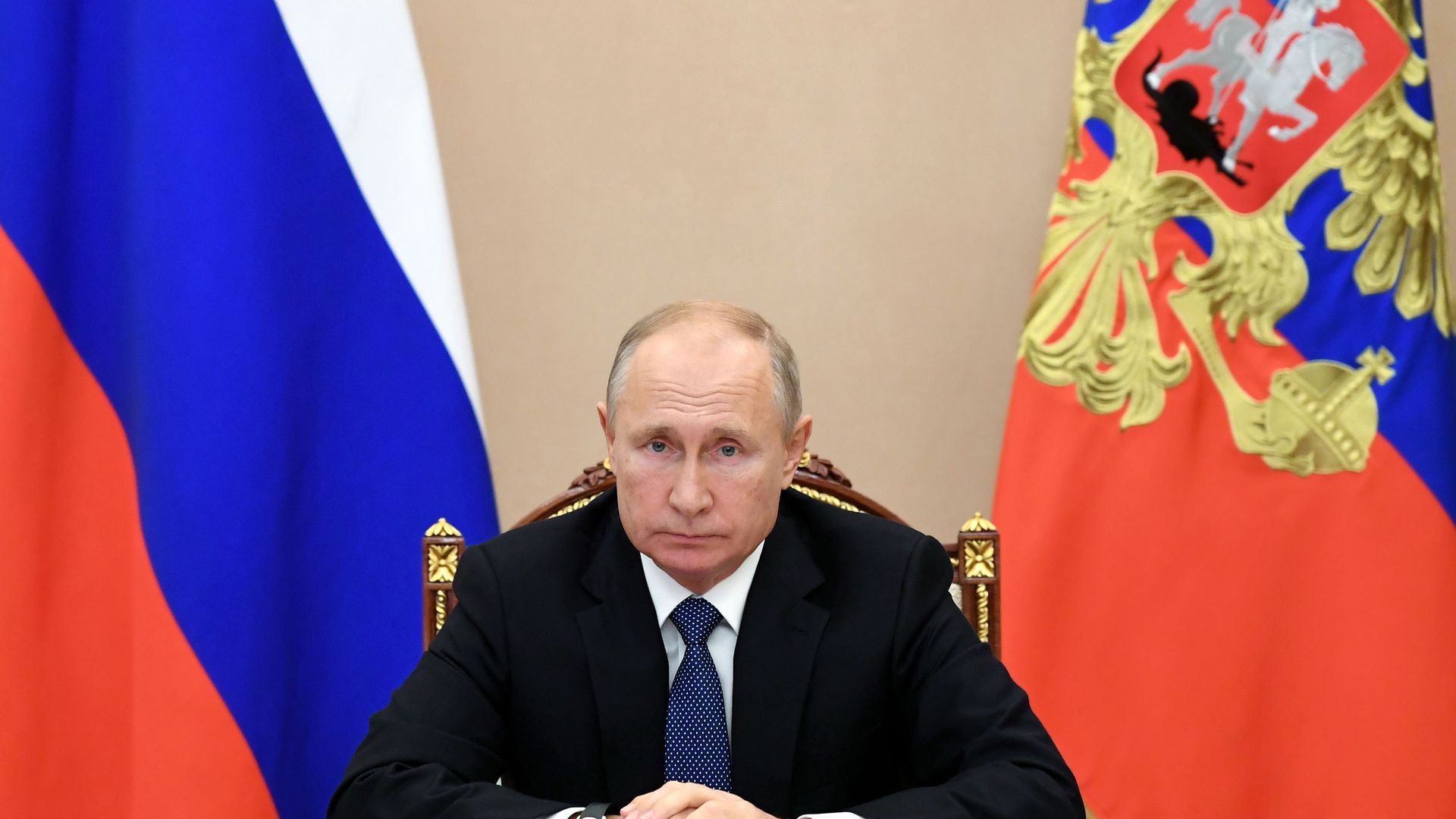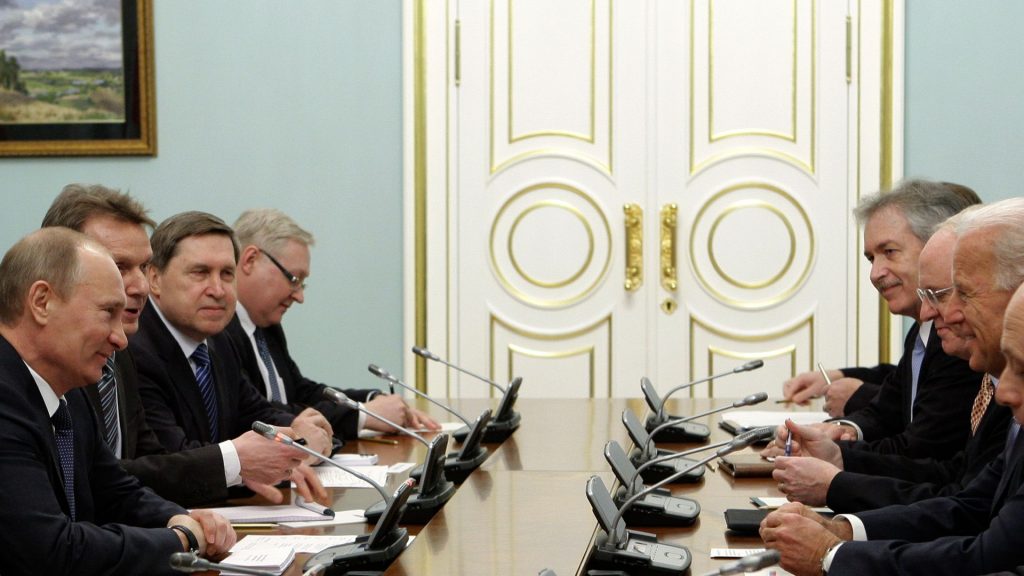
Joe Biden will be an infinitely tougher prospect for Vladimir Putin than Donald Trump. Yet the Russian president still has time on his side, says JOHN KAMPFNER.
George W Bush, not a man commonly thought of as soft, said this of Vladimir Putin at their first meeting in 2001: “I looked the man in the eye. I found him very straightforward and trustworthy. I was able to get a sense of his soul.” Barack Obama, on taking office in 2009, called for a “reset” in relations with Russia.
Putin has seen off several US presidents. The trajectory of the relationship is similar each time. The Americans give him the benefit of the doubt, try to get on the right side of him, invest time in the relationship – only to realise quickly that Russia is an adversary to be managed, not to be won over.
Joe Biden, one of the most experienced politicians and diplomats ever to move into the White House, has made clear he will not be starry-eyed. As ‘veep’ under Obama he witnessed the disappointment close up. He saw the fawning of Donald Trump towards his friend in the Kremlin and realised how dangerous it was to American security.
The issue assumed surprising prominence during the recent presidential election campaign. Biden attacked Trump for saying nothing about the poisoning of Russian opposition leader Alexei Navalny. Silence, Biden said, was tantamount to complicity. He made clear he would not hold back in any future cases: “It is the mark of a Russian regime that is so paranoid that it is unwilling to tolerate any criticism or dissent.”

Biden and Putin have met before, and there was no love lost. In an interview with the New Yorker magazine, Biden revealed that during a discussion with Putin in 2011 he told him: “I’m looking into your eyes, and I don’t think you have a soul.” He continued: “He looked back at me and he smiled, and he said: ‘We understand each other.’”
With Trump it was the opposite. At their famous press conference in Helsinki in July 2018 he ostentatiously took at face value Putin’s denials that Moscow had interfered in the 2016 presidential elections. Trump publicly disparaged the information given to him by his very own intelligence agencies, declaring: “They said they think it’s Russia. I have president Putin. He just said it’s not Russia. I will say this: I don’t see any reason why it would be.” The late Republic senator John McCain called it “one of the most disgraceful performances by an American president in memory”.
This bizarre relationship has always begged the question: what exactly does Putin have on Trump? Is it something to do with sex? One struggles to think of anything that might shock public opinion. Is it, is it, financial? The extent of Kremlin involvement in the 2016 election campaign – which Robert Muller’s enquiry was prevented from properly investigating – will almost certainly never be known. But neither Trump nor Putin have ever hidden their ideological sympathies.
Trump will soon be gone, in spite of his best efforts to cling to power. But, as the election results attest, Trumpism is anything but dead. Hence Putin’s refusal to recognise Biden’s victory – by contrast he congratulated Trump within hours of the networks declaring for him four years ago.
All he said this time was: “We will work with any future president of the United States – the one whom the American people give their vote of confidence.” This choice of words marked a return to the Soviet era of omitting the names of politicians that displeased the Kremlin. Pro-Putin media, both the mainstream and shock-jock varieties, used the opportunity to cast further doubt on the election result and to lampoon Biden. One programme showed an archive film clip of him meeting Andrei Gromyko, an ancient-era Soviet prime minister, from 1988. The message: he’s too doddery to be taken seriously.
Early into the transition, Biden has declared his intentions. At least in its behaviour, US diplomacy will return to the mainstream. The top team he has appointed, particularly in foreign and security policy, is stacked with experienced officials dating back to Obama and even to Bill Clinton. Led by the next secretary of state Antony Blinken, they are noticeable for being calm and sensible, everything Trump-land was not.
Biden will keep Putin at arm’s length. In any case, much of his attention at the start will be on dealing with Covid and emergency economic stimulus measures. But there will still be decisions to take. Will he follow the EU and UK and apply sanctions on six Kremlin officials that Europe says were involved in the Navalny assassination attempt?
The US introduced a Magnitsky Act, passed with bipartisan support by Congress in 2012. Named after a tax lawyer murdered in his Russian prison cell, it is designed to identify specific officials in foreign countries for human rights violations and to deny them access to finance or other rights in the US.
The act is being seen as a more effective punishment tool, as it targets individuals rather than entire countries. Other Western countries have followed its example. So far just over 50 Russian officials are covered by the American ban and adding more early next year will send a strong signal that Biden is serious. Will he also clamp down harder, and force internet giants to clamp down harder, on Kremlin-inspired cyber-attacks, misinformation and trolling?
The one area where he will have to do business with Putin is arms control (something he focused on during his long career in the senate), with the updated START treaty due set to expire in February. Signed by Obama and the then Russian president Dmitry Medvedev, it sets limits for both countries on deployed nuclear missiles, bombers and warheads. Coming to a deal on that would appear to be in both countries’ interests.
Overall Russia has factored in a much less indulgent approach from the Biden administration. Its media narrative will depict Russia as unfairly targeted by an old man – and an old system – flailing around, looking for scapegoats to mask its own inadequacies. It will seek to mock Biden and those around him.
Putin believes he can bide his time. The same view is taken by president Xi Jinping in China, Brazil’s Jair Bolsonaro, and Europe’s authoritarian outriders. Only a few days ago, Hungary’s Viktor Orban and Poland’s Mateusz Morawiecki, jointly declared their defiance of the European Union’s attempt to link regional development money with liberal social reforms.
Putin’s thinking is this: Trump may have lost but the great repudiation of his politics did not materialise. Indeed his 73 million votes was the second highest count in history, second only to Biden himself. The Democrat challenger may have hoovered up most of the new voters to ensure his victory, but there were precious few switchers.
In other words, these tens of millions of people – far more than the group one could call Trump’s base – have shown that they are prepared embrace or at least accept the dog whistle politics of the far-right, and more than once. If they were able to do that in spite of Trump’s woeful management of the pandemic and other crises, imagine the attractiveness of his chosen successor in 2024?
By that point Biden (or perhaps Kamala Harris who might have succeeded him by then), will have struggled to invigorate an ailing economy and to have pushed meaningful legislation through a divided Congress. The Republicans would have regrouped and will be an even more formidable force. That, at least, is the hope of both Putin, Trump and Son of Trump (whoever that may be).
In the spring of that same year, 2024, Russia will hold presidential elections, in which Putin will be allowed to serve for another two terms, under a constitutional reform and a joke of a referendum which the European parliament described as “enacted illegally”. This would take him potentially four decades of rule. Would the US, and the West more generally, decline to recognise the result, as has been mooted by some? That would put Russia in the category of Venezuela and Belarus. The answer will lie in whether Putin has managed to install a friend back in the White House.










